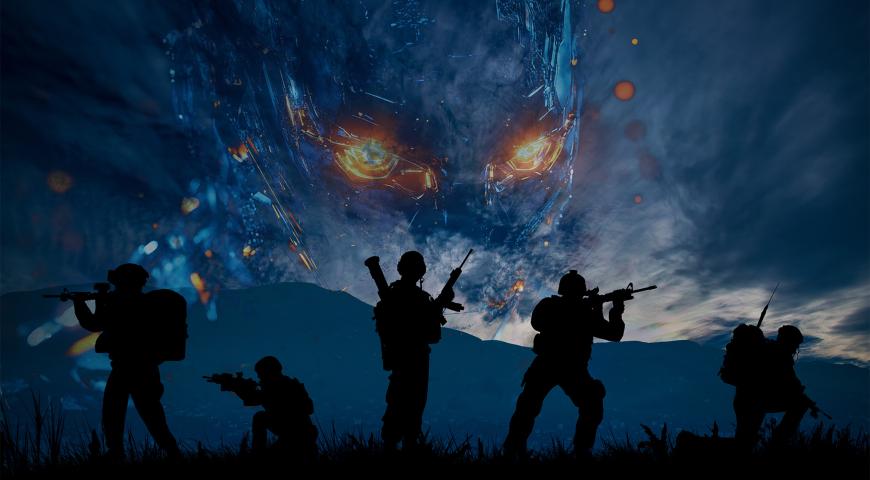International law is a topic which confounds most lawyers, let alone members of the general public or military personnel. Despite so much of it having been incorporated into the US Army’s DNA through the law of land warfare, the foundational premise of international law is so poorly understood that it tends to fall into the category of something soldiers have to learn about and comply with, but none really understand.
International law comes up in a variety of areas besides simply how soldiers must conduct themselves in wartime (jus in bello); it also comes up in discussions regarding the lawfulness of any given armed conflict (jus ad bellum), the minimum standards for treating civilians in stability operations (international human rights law), the appropriate national criminal jurisdiction that applies to certain acts (such as may be addressed in a Status of Forces Agreement), or the appropriate law under which an agreement, say to provide civilian logistics support assets in a forward operating theatre, should be construed and adjudicated in the event of a dispute (the so-called ‘conflict of laws’ (YouTube not available on the DPE) or ‘private international law’). Those of us with a background in international law often find ourselves having the same conversation:
Can we do that?
That may not be legal (under international law).
Why is legality (under international law) even relevant?
It may be of some service, therefore, to set out how this all works. The intention here is not to confer any especial legal insight, but to set out the basics as well as to act as a bridge—to translate the terms used in international law to terms with which the military community is more familiar.
Is international law a real thing?
It is. Really. The reason that most people have trouble with this—lawyers included—is that most people conflate having a real, live legal system with all the other things that, in a person’s everyday experience, come along with having a real, live legal system: a legislature to pass laws, law courts to interpret and enforce the laws, and a police force to maintain order in accordance with the laws. As it turns out, none of these things are necessary to have a legal system.
To explain why this is the case, it is important to understand that, in its inception, international law only really applied to countries and not to individual humans directly. To fully appreciate how this changes one’s concept of what a legal system is, one needs to take oneself out of a domestic legal context—where millions of individuals need to be managed and organised by a government so that their conduct falls within socially acceptable boundaries—and put themselves in the international legal context. In this reality, there are (today) only 190-odd ‘people’ that the international legal system needs to worry about. Further, these ‘people’ generally have long and very public lives. Some are larger and more powerful than others but all are equal in the eyes of the law. That’s fewer ‘people’ in the international system than there are representatives in the lower house of the US Congress or all the representatives in both houses of the Australian Parliament. With millions of people inside a country, not every person can participate in the legislature, interpret the laws, or help keep order. By contrast, in a smaller legal universe with far fewer participants, a lot of these familiar, domestic institutions would make no sense.
Who ‘makes’ international law—who decides what international law is?
The short answer is that countries themselves do. In the small universe inhabited by these 190-or-so giants, the law becomes the things these giants agree among themselves is the law. Because a legislature would be largely impractical for such a small group, this consensus among the 190-odd is evidenced in a variety of ways.
State practice (‘customary international law’). International law is formed by watching how these 190 giants conduct themselves as well as what they say that they believe the law is. In a domestic, national context this sounds silly: if I want to steal a package of candy from the corner store, all I have to do is say that ‘property is theft’ and taking what I need is suddenly legal and that’s the law? It also doesn’t work this way in the universe of long-living, public giants: if one country says ‘property is theft’ (or, more topically, ‘borders don’t matter’) today, the next time some other country wants something (say, territory) from the first, they will simply take it, citing the earlier proclamation. As a result of this potential for reciprocal action by adversaries, countries are remarkably consistent in what they say international law is. Even when countries act in an illegal way (New York Times Paywall), they typically go out of their way to at least pay lip service to the rules that everyone else agrees govern behaviour. In this way, the content of customary international law remains remarkably consistent. A potent current example is the Russian efforts to frame their invasion of Ukraine as legitimate by recognising ‘independent republics’ in the Donbas region… republics which then invite Russian assistance on their ‘sovereign’ territory; in the absence of any recognition of international law’s legitimacy, there would be no need to bother with this charade.
Treaties. These 190 giants make agreements among themselves. Sometimes, only two countries are parties to a treaty and it functions more like a contract, governing certain aspects of their relationship but not setting down rules of general application. At other times, so many countries participate in a treaty that it gives rise to rules of general application. This is particularly the case when the treaty is in force for a significant period of time. In this way, rules developed in the context of this category migrate into the previous category. The Geneva Conventions are a great example of this. The law regarding embassies and ambassadors is accepted as having been crystallised in a treaty document (the Vienna Convention on Diplomatic Relations of 1961 - Britannica Paywall), but it is of such wide acceptance that it arguably applies regardless of whether or not a country remains a party to the treaty—or never signed on to the treaty at all. The sources of international law are themselves similarly accepted as being set out in a treaty document, but their acceptance as sources predates the treaty itself and applies independently of the treaty as ‘customary’ law.
The writings of legal scholars. Sometimes it takes a smart guy to crystallise all the various ways that countries behave and articulate it in some coherent way. If these smart guys all lived a long time ago and didn’t have any particular axe to grind relating to the question currently being considered, and were generally respected for being super smart … then this works.
Decisions of international tribunals. So, remember the discussion about the international legal system being different from the domestic one and all the institutions we are familiar with at the domestic level not existing at the international level? Well, it turns out that there are international courts. Decisions of these international courts work like the decisions of courts in English-speaking countries with which most Americans are familiar from following decisions of the US Supreme Court: they have declarative effects, creating precedents that themselves form part of the law (think, until recently, of Roe v Wade and Plessy v Ferguson, itself later overturned by Brown v Board of Education). Courts in Australia have a similar role.
That said, the courts in the land of 190 giants function somewhat differently than the domestic courts. The big difference is that an individual person can get hauled in front of a local court by the local prosecutor (with the assistance of the police) against his or her will. International courts have jurisdiction according to the consent of the parties, either through some sort of general agreement in advance or as a result of an agreement to submit to the jurisdiction of the international court in a particular case. The case of the individual and of one of the 190 countries appear to be more similar if we make use of the notion of the social contract to imply the individual’s consent to the mechanisms of the government in the (democratic) country where he or she lives.
There are a lot of smaller international courts where, in order for them to assume jurisdiction over a matter, the countries have to agree to it—either by agreeing to submit to the jurisdiction of the court in that specific instance or signing up to the court’s jurisdiction by way of a treaty. The International Tribunal for the Law of the Sea is a good example (‘The International Tribunal for the Law of the Sea is an independent judicial body established by the Third United Nations Convention on the Law of the Sea to adjudicate disputes arising out of the interpretation and application of the Convention.’). The International Criminal Court is in this category, as are regional tribunals like the European Court of Human Rights.
The grand-daddy of the international court system is the International Court of Justice in The Hague, in the Netherlands. Like many international institutions, it is part of the United Nations system, which provides the framework for a good deal of international activity in the post-World War II era. This court’s jurisdiction also functions on the basis of consent, but consent here comes in different flavours and colours. All 193 countries that are parties to the UN Charter are also automatically parties to the Statute of the International Court of Justice (that’s just about everyone, except the Vatican’s micro-state and Palestine, which is currently a UN observer and may or may not be fully recognised as a country as yet). Being a party to the Statute of the court can be combined with a declaration that the court has compulsory jurisdiction over the declaring country—but this step is not itself compulsory. Only 83 of the 193 have actually signed up for the ICJ’s compulsory jurisdiction.
Who ‘enforces’ international law?
Mere mortals who exist inside national legal systems have difficulty in envisaging a legal system without a police force, but of course many countries existed without police forces for many years. Early civilisations had some form of city guards in urban centres (‘Constables were responsible for overseeing the night watch and for providing security … the investigation and prosecution of crimes was still left up to individuals.’), but in the English-speaking world ‘neighbourhood watches’ were only established in England in the 1200s, and through American slave patrols in the 1700s, with the first modern police forces only being established in the early 1800s. In the absence of police, the repression of crime was accomplished through the use of military force as needed.
The land of the giants functions as you might expect of such a small community: without a police force. Instead, they have adopted mechanisms for ‘enforcing’ the laws among themselves. In such a small community, peeing in the public pool can have consequences beyond simply being sanctioned by a lifeguard.
Reciprocity. This is the international law equivalent of the Golden Rule. In a world where offensive war (of conquest) has been outlawed by the UN Charter in the aftermath of World War II (international law and the use of force is a topic near and dear to military hearts but let us save that for another time, after we have mastered the basics), the classic example of reciprocity is embodied in Article 51 of the United Nations Charter: if someone engages in hostilities with you, feel free to engage in hostilities with them.
Sanctions. A determination that an act by one country is illegal may allow other countries to take actions in response which they might otherwise not be able to. These may be approved by some international organisation as the result of a formal process whereby retaliation against an offending country is explicitly authorised or may be imposed by a country, acting alone or in a group, in response to some perceived breach of international law by another.
Authorised collective action. For our purposes, this is when the United Nations Security Council gives a country or group of countries the green light to get kinetic. The Korean War fell into this category, largely because the Soviet Union (and its Security Council veto) was, at that time, abstaining from attending meetings. The United Nations also administers national military forces in certain (post-conflict) peacekeeping operations. Programs to establish a standing UN force have never gotten any real traction, certainly not outside of the realm of peacekeeping.
What’s the relationship between international law and domestic law?
In Australia, similar to other parliamentary systems such as the United Kingdom’s, international law applies domestically only in so far as it is expressly incorporated into domestic law by parliamentary legislation. This is because under such a system, the executive branch of government has the unilateral power to conclude treaties with other nations, but only the legislature has the power to create laws that define legal relationships inside the country. International law may, however, have an indirect effect on the development of the body of judge-made law that courts use to assist in deciding cases. The conduct of Australian forces domestically and overseas has been made subject to the principles of international law by service regulation and by domestic legislation that explicitly incorporates these requirements of international law into domestic, Australian law.
In the US, the position is different and more straightforward: unless there is some sort of direct and explicit conflict which cannot be reconciled, US law incorporates and embodies international law. Yup. This isn’t even a controversial point, although there will always be some nuance here for the lawyers to argue over. The United States Supreme Court has said so, many times.
‘[A]n act of Congress ought never to be construed to violate the law of nations if any other possible construction remains …’
Murray v. The Charming Betsey, 6 U.S. 2 Cranch 64 (1804), United States Supreme Court
‘For two centuries we have affirmed that the domestic law of the United States recognizes the law of nations.’
Sosa v. Alvarez-Machain, 542 U.S. 692 (2004), United States Supreme Court
Why is international law relevant? In Australia, international law creates legitimate expectations as to how the government will act, as well as creating direct obligations by Federal Parliament explicitly incorporating crucial elements of international law directly into the Australian legal system. In America, international law is relevant, because America is a nation of laws and international law is automatically incorporated into that body of laws according to accepted principles of US law.
Biography
Garri Benjamin Hendell is a Major in the Pennsylvania Army National Guard. Although he is not a lawyer in the Army, lawyering is a thing he used to do. In addition to his 19A (19C!) branch designation in the Army and his 07J additional skill identifier, he holds law degrees from the University of Oxford, the Université Libre de Bruxelles, and the New York University School of Law. He practiced law for over ten years at a 600+ lawyer firm. He later worked at the National Guard Bureau, initially in uniform, and later as a civilian branch chief.
Defence Mastery
Technical Mastery
Please let us know if you have discovered an issue with the content on this page.
Comments
Start the conversation by sharing your thoughts! Please login to comment. If you don't yet have an account registration is quick and easy.




